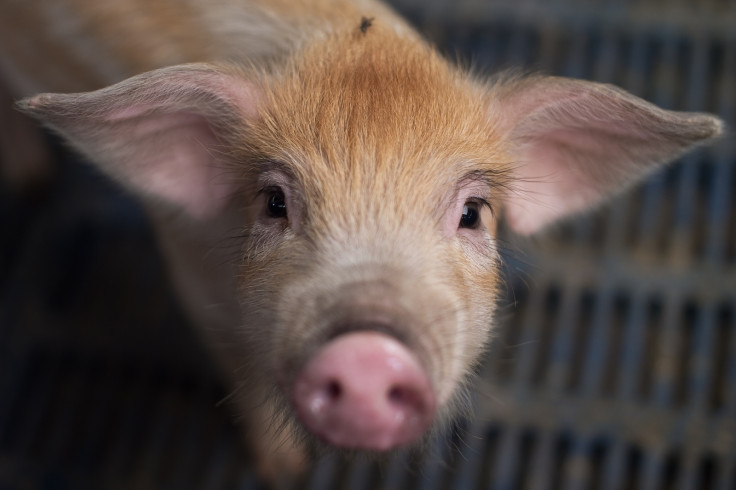Don't blame the firefighters who ate piglets they rescued, blame our carnist society
A stay of execution after all the effort of the rescue felt plain wrong, even to some of those who eat pigs.

There was a collective shudder when news broke of the firefighters eating the pigs they had saved from a blaze. The fact that we had all been celebrating the heart-warming news of their survival just six months earlier made it even harder to swallow.
It brought into sharp focus the absurdity in the way society regards farmed animals. "I'm sure vegetarians will hate this," said the pig farmer, perhaps with awareness that on some level it might be morally questionable. And yes, just as predicted, they hated it.
Not just vegetarians or vegans. Even some meat eaters found it offensive. Saving someone from a fire usually means a happy ending, not one with such a macabre twist.
A stay of execution after all the effort of the rescue felt plain wrong, even to some of those who eat pigs.
If this had been a golden retriever or tabby cat on the barbecue after being rescued, we would all quite rightly be horrified – every single one of us.
Just imagine the faces of the firefighters taking delivery of minced cat burgers or dog-leg drumsticks. There would be shock, disgust, disbelief, even anger. The story would quickly go viral, triggering an outpouring of mass public outrage.
This scenario is not quite hypothetical, actually. It was played out last year through La Table Suisse, the first European restaurant to serve cat – albeit not for real. It was a hoax, a PR stunt that very cleverly exposed the hypocrisy of eating one animal and loving another.
Likewise, the Yulin Dog Meat Festival in China, where up to 15,000 dogs are killed and eaten over a 10-day period, elicits outpourings of grief and horror, with petitions circulating worldwide.
Pigs are no different to dogs or cats. They are known to be highly intelligent, more so than dogs, with the same cognitive abilities as a three-year-old child and the same ability to feel happiness and pain. They are highly social beings that love to play. They have good long-term memories, and form complex social relationships. So then why are pigs not also our loved, cherished companions?
It's because of 'carnism', the invisible belief system, or ideology, that conditions people to eat certain animals and not others.
The term 'carnism' was coined by the social psychologist Dr Melanie Joy, whose organisation Beyond Carnism created the La Table Suisse awareness campaign. Joy is also the co-founder of the international food awareness organisation ProVeg.
Carnism is the dominant ideology in our society. It conditions us, including the Wiltshire firefighters and farmer, to see pigs with no value except their taste and price of their flesh. So, it's not their fault per se. It's just cultural conditioning. Carnism is the problem, not the farmer or meat eater.
Unfortunately, the story in Wiltshire is indicative of farming more generally in the UK. Animals are seen as nothing more than commodities, numbers, and ultimately, profit.
And when profit is a priority, corners are cut and standards drop – just look at the recent news of hepatitis-infected sausages in UK supermarkets. It seems the industry has almost as much disregard for consumer welfare as they do for animals.
We can very easily have a much more just and fair world. The owner of the Wiltshire farm said, "An inevitable part of farming is the death of an animal which gives us the food to eat."
Yet death is neither necessary for our survival, nor is it inevitable - it is only maintained because it is profitable and people believe it to be natural, normal and necessary. It is none of these things.
Understandably, farmers see no other option. But what about growing plant-based protein that is better for our health and the environment and doesn't inflict lives of pain and suffering upon animals?
Diversifying away from livestock farming is not easy, and public money must be made available for it, but it is already happening. A Derbyshire beef farmer recently gave his herd of cows to an animal sanctuary, and is now running a vegan organic market farm supplying garden produce without using animal products or fertilisers.
He "couldn't believe it was right to eat them", adding that "cows have a range of emotions. I've even seen them cry. It was very difficult to send them to the slaughterhouse for what must be a terrifying death."
We can all make our own contribution. Start by making changes to your diet. Go vegan, or be as vegan as possible. Do what you can, start cutting down and add to the 28% of the UK population that is reducing their meat consumption. Even small changes made by a lot of people can make a huge difference in the world.
Jimmy Pierson is the UK Director of ProVeg, a new international food awareness organisation with the mission to reduce global animal consumption by 50% by the year 2040.
© Copyright IBTimes 2025. All rights reserved.




















